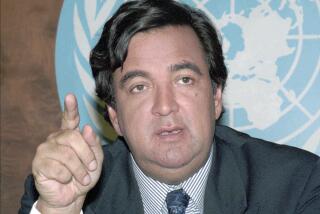PERSPECTIVE ON GOVERNMENT SERVICE : In Olden Days, the Great Might Wander Among the Little People and Listen : Henry Wallace was vice president, but first he was a farmer; he once rolled up his sleeves and changed the world.
- Share via
In late 1940, Franklin D. Roosevelt received a troubling report on the political situation in Mexico. Manuel Avila Camacho, a democrat who supported friendly relations with the United States, had won the presidential election, but his opponent, Gen. Juan Andreu Almazan, was threatening to void the results in the streets. Worse yet, Almazan leaned toward the Axis powers, and he was actively supported by Nazi elements bent on revolution.
Roosevelt assumed that the United States would soon be involved in Europe’s war, and the last thing he wanted was a hostile country on the southern border. To underscore support for Camacho Avila in the strongest way possible, F.D.R. delegated his own running mate, Henry A. Wallace, to attend the inauguration on Dec. 1.
There was only one problem: Wallace had no standing as a government official at the time. He had resigned as secretary of agriculture during the campaign. He had been elected vice president but wouldn’t take office until January.
So Wallace was made a temporary employee of the State Department, appointed a special ambassador and outfitted with a set of official papers.
With that, the vice president-elect/special ambassador climbed into his Plymouth and drove himself to Mexico City.
The State Department paid Wallace $50 a day for his expenses, plus five cents a mile for his car.
No aides, no advance team, no PR people, no security agents accompanied Wallace on the trip; only his wife, Ilo, and another couple, old friends who went along for the ride.
At every break in his official schedule, Wallace would drive into the countryside to see with his own eyes how eight out of 10 Mexicans--those who earned their living from the land--actually lived. When his official duties ended, Wallace lingered in Mexico until after Christmas, working his way through its rural areas at a leisurely pace, talking (in Spanish) to as many people as he could.
What he learned appalled him. The very best farmland he saw produced not much more than 20 bushels of corn per acre, and yields were falling annually because of poor farming practices. That year, Wallace’s native state of Iowa, with one-eighth the population of Mexico, produced eight times as much corn.
Most of the land Wallace saw was still planted with the aid of a pointed stick. Crops were weeded, harvested and husked by hand. The corn was soft and starchy and difficult to store properly. On the market it was worth only about 35 cents a bushel. The cash income these Mexican farmers derived from their land was little more than $100 a year.
Wallace drove back to the United States believing something should be done to help Mexican farmers. He proposed a plan to the Rockefeller Foundation to help bring scientific agriculture to Mexico. Thus was planted the seed from which the international agricultural experiment stations grew. The great “green revolution” produced by these experiment stations unquestionably did more than any one thing to improve the lot of people in developing countries.
Wallace’s trip, intended as no more than a political gesture, in effect transformed world food production, saving and enriching countless lives.
Today’s use of government aircraft to take high officials on golf and skiing trips could hardly be a starker contrast. Increasingly, it seems, the status and importance of high government officials is based on a competitive escalation of the trappings of power rather than accomplishment and service.
It will be said, of course, that the world is a far more dangerous place than it was 50 years ago, that government is vastly busier and more complicated.
But it is worth reminding our officials that their value to our democracy is not properly measured by the retinues of aides and Secret Service agents in their entourage, the size of their jets or the number of limousines in their motorcades. These perquisites of power do nothing to enhance the opportunity and well-being of the common man, which, after all, is the real reason anyone should be in public life.
More’s the pity that today’s public servants, with all their advantages, rarely accomplish anything as worthwhile as Henry Wallace accomplished alone in his Plymouth.
More to Read
Get the L.A. Times Politics newsletter
Deeply reported insights into legislation, politics and policy from Sacramento, Washington and beyond. In your inbox twice per week.
You may occasionally receive promotional content from the Los Angeles Times.










